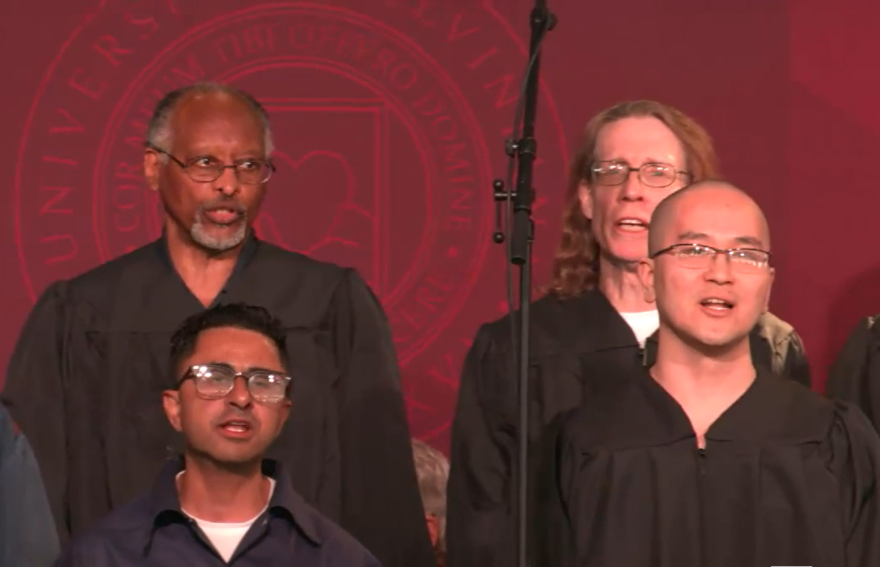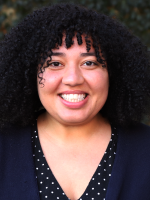Dozens of inmates received a college degree at a state prison in Ionia earlier this week. But during the graduation ceremony, no one was calling them prisoners — just graduates.
Pomp and circumstance played; worship songs were sung.
Clad in blue prison scrubs under their traditional black graduation gowns, topped with the cap and tassels, 45 of the students received a bachelor’s degree, and 31 got their associates.
They’re the same as the degrees awarded to other graduates of Calvin University. But these diplomas were earned in prison.
The men were graduating through a program called the Calvin Prison Initiative at the Richard A. Handlon Correctional Facility.

Christopher Bernaiche said he didn’t think he was smart enough for the degree. He said he's a "lifer," sentenced to life in prison without parole. He's been in prison for 20 years.
"I initially thought that because I have all the time in the world on my hands, I thought, you know, I’ll have plenty of time to get all this done," he said. "It’s not like that. There’s a lot of extracurricular programming, programs going on," he said.
Extracurriculars like the choir Bernaiche has joined. That’s something he said he would never have done before starting his education.
Now he’s one of the men singing in front of hundreds of people at the graduation ceremony.
Anthony Willis, another one of the graduates, said the path was difficult. "It wasn't easy to get this degree," he said. His two children that he hadn't seen in 14 years attended the ceremony.
Willis said the prison dorms can be loud and distracting. The school-issued laptops did not have internet access.
During the pandemic, the usual in-person classes were all virtual.
Willis said it was worth it.
Bryan Harr was receiving his bachelor's degree. He’s spent 28 years in prison.
"Prison life is already a challenge, but when you factor in making that individual choice to start moving in a positive direction and making the positive decision on the yard each and every single day, and then taking on the workload," he said, "it was still the most challenging experience of my life in here."
As Calvin’s Program Director Todd Cioffi pointed out, most of the students are serving life sentences.
"Two-thirds of our guys are serving life sentences, the other third are serving long sentences. We believe that these are the guys though who are here. This is their world. This is their community and so we want to equip them to make this the best place it could become," he said.
Twenty students have been accepted into the program each year since it began in 2015. All of the graduates are getting a degree in Faith and Community Leadership.
Calvin and state corrections officials said as far as they know, this is the first program of its kind in the state.
The program costs around $800,000 a year, according to Calvin University officials. For the first six years, donations supported the program.
In the past year, the program got almost 60% of its annual budget from Second Chance Pell Grants.
COVID-19 stalled the original 2020 commencement ceremony. That would have been the first class of graduates to finish the program. So now, graduates from 2020, 2021 and 2022 have all been celebrated together as the first group of alumni.
The graduates accepted into this program have at least seven years left in their sentence until they’re eligible for parole.
For graduates who do get released, studies have shown higher education in prison reduces recidivism.
The Federal Bureau of Prisons has found that inmates who participate in correctional education programs have lower odds of returning to prison. It also says every dollar spent on in-prison education saves four to five dollars over the cost of reincarceration.
Michigan Department of Corrections Director Heidi Washington said that’s part of why the program’s success is important. Washington was among the speakers at the prison graduation. She said she attended several graduations on university campuses last weekend.

"There’s really only one thing that separates you from the graduates I saw, and many other graduates: Your grades are better," Washington said. "And I wouldn’t say that if it’s not true."
Like many other graduation ceremonies, inspirational speakers encouraged the graduates to continue their studies.
Jerline Riley, called Mother Jerline by some of the graduates, gave one of the commencement addresses.
"As I watch you young men, that gives me hope for mankind. If they counted you out, and you making it, they counted me out and I’m making it, what the rest of the world can do if we get on the side we all on together?" she said.
As each student took his diploma, family, friends, and fellow inmates cheered them on, some in tears.
Many of the graduates opened their diplomas repeatedly, as if checking if they were real.
But assurances from Calvin University officials, hugs from family and friends, and other inmates cheering them on affirmed that yes, these diplomas were real — just as real as anybody else’s.






